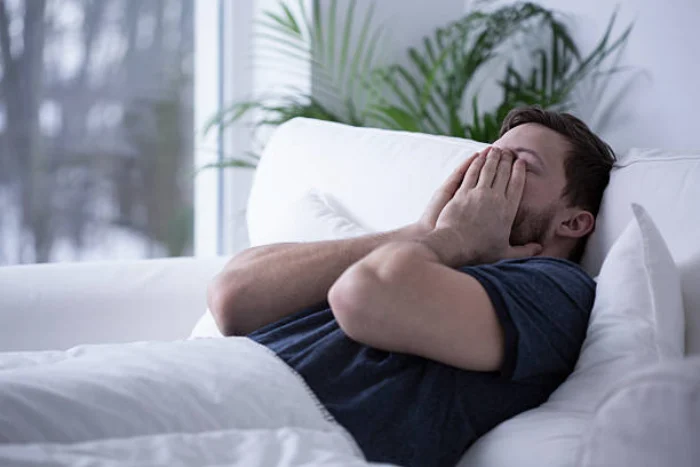Few things are more frustrating than lying in bed, desperately craving sleep, and not being able to drift off. When you’re sick, this can be worse. While some illnesses may not affect your sleep, others can leave you tossing and turning all night. Why can’t you sleep when sick?
Coughing, sneezing and body aches can all make it difficult to stay comfortable enough to get restful sleep. Temperature changes can also be an issue.
Stress and anxiety will often keep you awake when you’re ill. Digestive issues and dehydration can also disrupt your sleep, as will any medications you may take for the illness.
Let’s discuss these reasons for insomnia while sick and how you can overcome them.
Reasons Why Can’t You Sleep When You Are Sick and Their Solutions
Getting a good night’s sleep can feel daunting when you’re sick. Your body is filled with pain, and your mind worries about your health. There are actually several reasons why the Sandman seems to be avoiding you when you’re under the weather.
No 01: Physical Discomfort
During sickness, your body can experience physical discomfort, such as aches and pains, congestion, or a sore throat. This discomfort can make finding a comfortable position and staying asleep difficult.
Physical discomfort can cause tossing and turning when you’re trying to sleep, which may interfere with hours of restful sleep. The solution for physical discomfort is to take prescribed medication to help ease the symptoms.
Taking a warm bath or using a heating pad to warm painful areas helps alleviate the discomfort and promote relaxation. Relaxation techniques such as deep breathing or meditation can reduce physical symptoms and promote restful sleep.
No 02: Coughing and Sneezing
These symptoms can make it difficult to breathe comfortably, and this can disrupt your sleep. When lying down, congestion can increase because of the mucus build-up in your nasal passages. This congestion can make breathing hard, leading to coughing and sniffling and may wake you up at night.
Treatment for coughing and sneezing when sick includes taking medications that target those symptoms, such as cough suppressants and nasal decongestants. Drinking plenty of fluids and using a humidifier or vaporizer can also help clear nasal passages.
No 03: Temperature Changes
Your body’s temperature may fluctuate when you’re sick, such as when you have a fever or chills. These changes can make it challenging to regulate your body temperature and can disrupt your sleep. When your body is cold, it tries to warm you up, which can cause shivering and restlessness.
Temperature changes can be handled by taking fever-reducing medication, dressing in lighter clothes for fever, and keeping the room comfortable with a fan or air conditioner.
No 04: Medications
Certain medications that treat illnesses can have side effects that disrupt sleep, such as stimulating effects or drowsiness. That’s why taking medicine according to your doctor’s prescription is essential. Taking medications at the right time can minimize side effects and help you sleep better.
If you’re struggling to manage medication side effects or if a medication is causing persistent sleep difficulties, talk to your doctor. They may adjust the dosage or recommend an alternative medication.
No 05: Stress and Anxiety
Being sick can be stressful, and worrying about your health can cause anxiety, interfering with your ability to fall asleep and stay asleep. When you’re anxious, your mind races, making it tough to shut off and relax. Trying to calm your mind and distract yourself can help alleviate anxiety.
Consider using relaxation techniques like deep breathing or mindfulness meditation to calm the mind and promote relaxation. Talking to someone you trust or a therapist can also help reduce anxiety levels. The next time you feel anxious, you can also take sleeping pills for next day delivery online.
No 06: Digestive Issues
Certain illnesses, such as gastroenteritis, can cause digestive issues like nausea, vomiting, or diarrhoea, making sleeping challenging. These digestive issues can cause abdominal pain and discomfort, leading to restless sleep.
Avoid foods that can trigger symptoms and stay hydrated to address digestive issues when sick. Taking medication prescribed by your doctor to manage the specific condition can also help alleviate digestive issues, making it easier for you to sleep.
No 07: Dehydration
To fight off infections and stay hydrated, your body needs more fluids than usual when sick. You may feel more fatigued and have trouble sleeping if you’re not drinking enough water or other fluids.
Dehydration can cause headaches, dry mouth and throat, and fatigue, leading to sleep difficulties. Drinking plenty of water and other fluids can help you stay hydrated and reduce the effects of dehydration. Avoid caffeine or alcohol, which can dehydrate you and make sleeping more difficult.
No 08: Disrupted Circadian Rhythm
Your body’s natural circadian rhythm can change when you’re ill, which regulates sleep and wake cycles. When this disruption occurs at night or in the morning, it can be difficult to fall asleep or wake up. Maintaining a consistent sleep schedule can help regulate your body’s natural circadian rhythm.
Go to bed and wake up simultaneously every day, even on weekends. This routine can help train your body’s internal clock to anticipate sleep.
Avoid naps during the day and minimize exposure to screens, such as computers, phones, and televisions, close to bedtime, as they can negatively impact your circadian rhythm.
If you continue to have difficulties sleeping due to a disrupted circadian rhythm, consult with your doctor, who may be able to recommend treatments or medication.
Utilize the Power of Sleep to Overcome Sickness
Getting a good night’s sleep while sick can be a challenge, but understanding the various factors that can affect sleep can help you find relief.
You can improve your chances of getting a restful night’s sleep by addressing discomfort, regulating temperature, managing symptoms with medication, and practicing relaxation techniques.
Remember to stay hydrated and maintain a regular sleep schedule to help regulate your circadian rhythm. Hopefully, with these tips in mind, you’ll be able to sleep soundly and wake up feeling refreshed even when you’re not feeling your best.





